Opinions & Interviews
Press secretary shares new details of Lukashenko's foreign tour
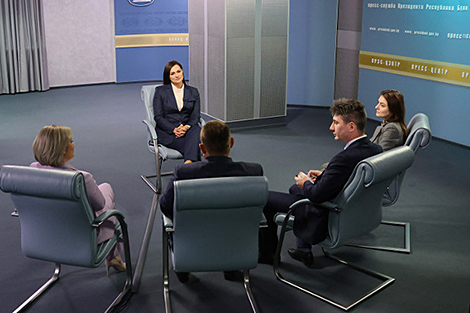
Belarusian President Aleksandr Lukashenko made a large foreign tour, which included visits to the Middle East and Southern Africa. The head of state twice visited the UAE, where he held a number of fruitful meetings and negotiations, and also paid a state visit to Zimbabwe. Press secretary of the Belarusian head of state Natalya Eismont shared some new previously unknown details of the meetings and negotiations of the Belarusian leader.
A lot has been said and shown about the visit of our head of state to the UAE and Zimbabwe. Gigabytes of text and terabytes of video information. Lots of numbers. First of all, the economy. Meetings, interviews and so on. But, probably, there is something left behind the scenes Even we, journalists who covered these visits, did not see everything. You know, we now see an inflow of insinuations and fake news that not all the meetings took place, that too emotional spectators were not allowed to the Belarusian leader, and so on. Still, what was the schedule of the head of state during these busy days?
I would say that this large trip of the head of state can be called unprecedented. First, as journalists of the presidential pool, you know that it is extremely rare that the president leaves the country for so long. The reason must be very good for this. Negotiations and plans must be worth it. That was how it was this time.
I suggest we talk about everything in order. We can say that this large trip of the head of state consisted of three parts. A visit to the United Arab Emirates, then a state visit to Zimbabwe and back to the UAE.
If we talk about the first part, most of it, almost all the work of the head of state, was, in fact, hidden from anyone's eyes. It wasn't public. But at the same time, it was a very, very intense process. I will speak in general terms. The work plan for this first part of the visit was not only 100% completed. It was exceeded.
There were two main items on the agenda. Of course, it was security. This is something that the whole world, all countries without exaggeration, are concerned about today.
At the airport, the head of state was welcomed by the Minister of Interior, Deputy Prime Minister of the United Arab Emirates, the brother of the current head of state. You know that such things happen for a reason. A brief meeting took place at the airport. Then, the discussion of the topic of security continued.
The second item on the agenda of the first part of the visit was economy. There were very different meetings. Let's start with the largest investment project that the United Arab Emirates is implementing in our country - the famous Northern Waterfront project worth $5 billion in investments. All of this speaks for itself. The president held a meeting with the management of the company. They had a lot of things to talk over. Various questions and nuances were clarified. Deadlines were also specified. The president would like the project to peak up steam faster. There are a lot of nuances. They had to be discussed.
Further, without naming specific topics or names I will say that the head of state held a meeting with Russian businessmen in the United Arab Emirates, and even with Belarusian businessmen who asked for a meeting. These meetings took place there. There were reasons for this, too. Some meetings were not even initially scheduled but they took place.
Arriving late in the UAE on Wednesday evening on 25 January the president had this intensive schedule during the following four days: Thursday, Friday, Saturday and Sunday. You know how busy the schedule of the head of state usually is. So I want to say that even in Minsk, sometimes the president's schedule is not as intensive as it was in this first part of the visit.
Regarding the state visit to Zimbabwe: other there any aspects that have not been mentioned yet? What prospects does it open for Belarus?
A lot has already been said about the visit to Zimbabwe. Indeed, this visit was very widely covered in the media. And rightly so. The future belongs to Africa. You all know perfectly well that our head of state say such theses for a reason.
Answering your question, I would like to dwell not on contracts - a lot has been said about hundreds of millions of US dollars, the results of the business forum, and so on - but on contacts. This is, in principle, the thesis that, in my view, describes this big presidential trip. All of the past ten days. Contacts were the most important thing for us. They, of course, then turn into results.
With regard to Zimbabwe, I mean the things that have not been made public: these were defense and security issues. The journalists, who worked with us, were present at the reception, too. This was a very special event. Different countries have their own traditions. In general, a reception is an informal communication, a cultural part of the visit. It is a special, more relaxed moment. Here it was quite different. There is a tradition in Zimbabwe for heads of state to give speeches at the reception and to dwell on the results. Our president made a very serious speech, which was heard, including by journalists. He touched upon these issues there. I mean defense and security issues. These issues were discussed in detail.
I can also mention the third day of the visit. Victoria Falls. Of course, our media showed these stunning views of Zimbabwe’s nature. They paid attention to it in the first place. However, I would like to say that there were informal meetings there, too, and the presidents talked a lot. One of the main topics on the third day of the visit was cooperation in healthcare.
You have already written a lot about food security in your reports. It is ensured. It is, of course, very important. We continue to work in this direction. Here we have a follow-up topic on healthcare: maternal and infant mortality. This is the area in healthcare where Belarus has very good results. Here we can help our Zimbabwean friends: to support the babies who have just been born, feed them, and so on. The presidents talked a lot about the topic and also about other areas in healthcare. In the very near future, our Healthcare Ministry will form a group of specialists who will immediately begin to implement the agreements reached by our head of state and his counterpart on the third day of the visit.
Of course, we show interest in different areas in Zimbabwe. Mineral extraction is among them. This is the area where we have already reached certain agreements, where we can expect results soon. The supply of cotton raw materials is an important area of cooperation for us. Our light industry and also others are engaged in the matter. Let's say we are already moving along this path.
Speaking of prospects, and I would like to emphasize it, the most important thing is the prospect of cooperation of Belarus with the entire south of Africa. That is the most important thing we should talk about today. This visit to Zimbabwe is, of course, the first stone in the foundation of our relations with this region.
I'll share with you one piece of inside information that journalists love the most. Just on the third day of the visit, the president of Zimbabwe told the Belarusian head of state that he received calls from a dozen of heads of state - leaders of the countries of Southern Africa just at the end of the main negotiating day. They keep in very close contact with each other. They all had one question: how did Zimbabwe manage to bring Lukashenko and carry out such a fundamental and eventful visit. They all expressed willingness to establish close cooperation with the Belarusian head of state, with our country.
Belarus has a lot to offer these countries. There are also things that we are interested in in Southern Africa. I can give you an example: when speaking to journalists at a press conference, our president mentioned Mozambique. This is the country we are already entering, including with the help of Zimbabwe. This is something that is already in happening. Food security issues are also very important there. We can participate in that country’s projects. It is already a very concrete discussion. Our focus is on cooperation with the entire Southern Africa.
I would like to emphasize a very important point once again: the future belongs to Africa. We will all see soon that this is true.
The reception in Zimbabwe was really warm, very unusual. We all saw the images how Aleksandr Lukashenko was welcomed at the airport. These images flew around the world. We, too, felt this welcome and were very impressed...
Such things cannot but impress. They are amazing and impressive. Each country has its own traditions. I am convinced that if you host friends, you want to show your best. Therefore, such a broad gesture, such an amazing welcome, which really surprised and amazed us all. Songs and dances were stunning. All the attributes of the official welcome ceremony were there too.
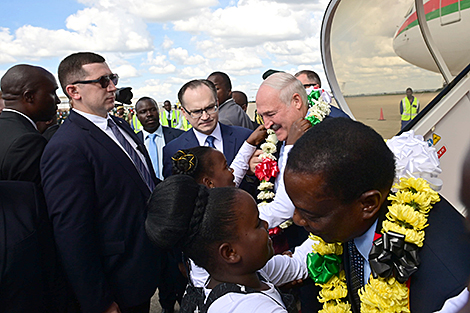
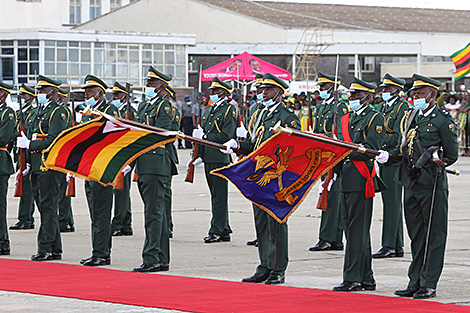
Not everyone from among the people who were invited was able to get to the airport. Our Zimbabwean colleagues said that many more people wanted to come and greet the Belarusian leader. This, firstly, shows their hospitality. Secondly, the attitude towards our president, our country, and all of us.
There is another interesting point: when we drove through the city we saw a huge number of people on the streets. They went out to welcome and greet our president. When our president asked President Mnangagwa about this he gave an interesting answer. People took time off from work, asked their employers to let them go from work for a short time in order to greet the Belarusian president and the Belarusian delegation on the Zimbabwean soil.
This is very nice. Our president knows how to make friends and how to cooperate with countries and continents that are open to this. Of course, we all appreciate such friendly, very nice gestures.
If we return to the topic of the UAE visit, the negotiations with the president were held in a friendly atmosphere too. What are the results? Here we, too, were bombarded with an inflow of fake news about capital, mansions, sons and so on…
As originally planned, after the state visit to Zimbabwe, the head of state returned to the United Arab Emirates and met with UAE President Sheikh Mohamed bin Zayed Al Nahyan. This is a very important moment, the first meeting with him in his current status. Although the leaders have been on friendly terms for a very long time. They have had many meetings in previous years when Sheikh Mohamed bin Zayed Al Nahyan was in the status of crown prince. Meetings have always been very serious, very promising. This, of course, is the main point.
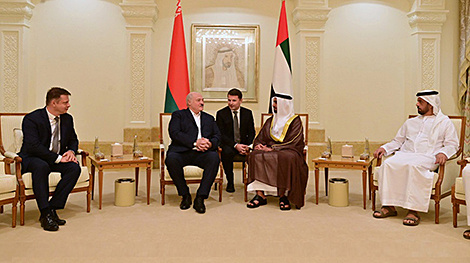
The meeting lasted four hours and was held in a friendly atmosphere. It all speaks for itself.
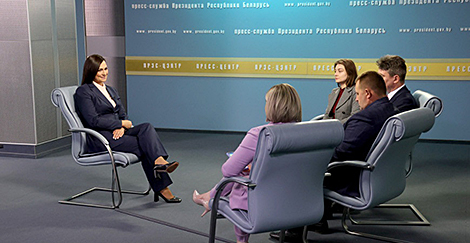
I cannot reveal any new details of these negotiations today. There is a specificity of the moment. We all understand that the results that the whole country and people will feel in the future will be much louder than the words that we can say today.
A lot of work is going on today. We have outlined areas: trade, economy, investment and humanitarian dimension. They are closely intertwined. It was a very, very promising conversation. Let’s just leave it at that today.
As for fake news... First of all, I would like to address the topic of sons. Or rather, the eldest son and the reason why Viktor Lukashenko is generally present among the members of the delegation. Every country has its own specificities, including in building diplomatic cooperation. For the countries of the Arab world, this is a very special status, a special level of trust, when relations are supervised by someone from the family of the leader, the head of state. Especially if it is a son or eldest son. This initially sets a special tone of cooperation. This raises the bar as much as possible.


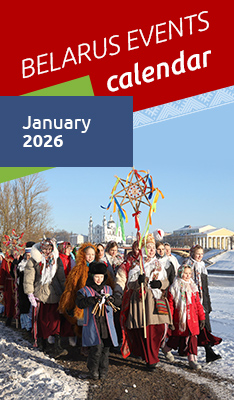




 print version
print version make home page
make home page add to bookmarks
add to bookmarks

